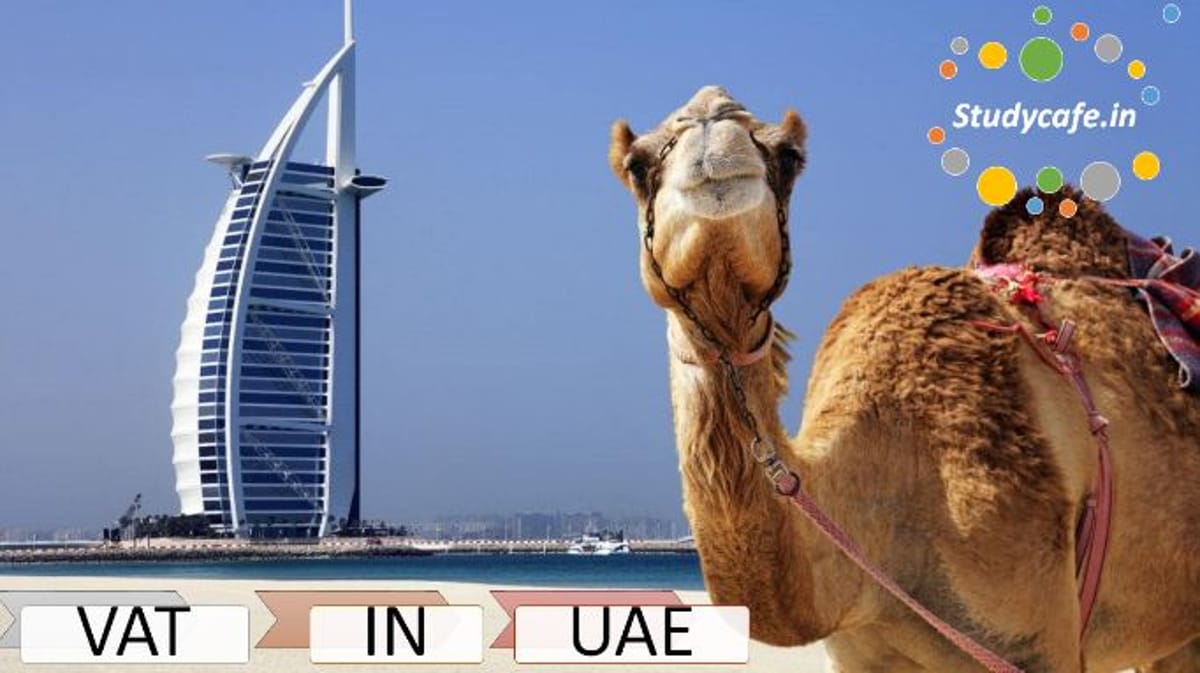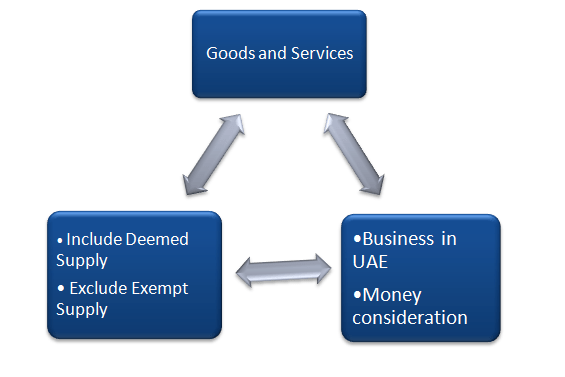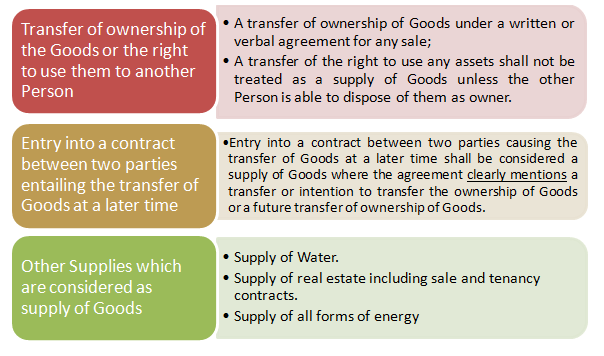CA Deepak Bharti | Nov 25, 2018 |

german vat act, journal on gst india, dutch vat act 1968, Articles under VAT law and their Analysis, Analysis of variousArticles under VAT law,Analysis of variousArticles under UAE VAT law
Articles under VAT law and their Analysis: Analysis of variousArticles under VAT law
Article-2 of Decree law provides scope of VAT in UAE, which provides VAT shall be levied on:
a) Every Taxable Supply and Deemed Supply made by the Taxable Person.
b) Import of Concerned Goods except as specified in the Executive Regulation of this Decree-Law.
Definition of Taxable supply has been provided in Article-1 of Decree law. A supply can be said to be Taxable supply if it satisfies below ingredients:
1. Goods or Services must be involved in a transaction of supply.
2. Consideration must exist as an equitable exchange for the goods or services.
3. Two Persons must be involved in the transaction.
4. Transaction must occur in the course of Business of the Person.
5. Such Business must be organized and undertaken in the State of UAE.
6. It should not be an expressly Exempt Supply.

Article 3 of Decree law provides, without prejudice to the provisions of Title Six of this Decree-Law, a standard rate of 5% shall be imposed on any supply or Import pursuant to Article 2 of this Decree-Law on the value of the supply or Import specified in the provisions of this Decree- Law. This single rate in itself may avoid a number of complexities and issues of classification.
The Tax imposed shall be the responsibility of the following:
1. A Taxable Person who makes any supply stipulated in Clause (1) of Article 2 of this Decree-Law.
2. The Importer of Concerned Goods.
3. The Registrant who acquires Goods as stated in Clause (3) of Article (48) of this Decree- Law.
In the case of Domestic transaction, the Taxable Person means who makes the Taxable Supply will be responsible to deposit the tax. In the case of Import of Concerned Goods, the Importer will be responsible under reverse charge mechanism.
Article 5 of the Decree Law: The following shall be considered as supply of Goods:

Supply of Goods
Few Examples for more clarify:
| Form of Arrangment | Ultimate Purpose | Supply of Goods or Not |
| Sale | Transfer of ownership | Yes |
| Barter Exchange | Transfer of ownership | Yes |
| Free Stocks/gifts | Transfer of ownership | Yes |
| Tenancy contract ofcommercial property | Transfer of Right to use | Yes |
| Hire-Purchase | Transfer of Right to Use with Transfer of ownership | Yes |
| Transfer | Compulsory acquisition | Yes |
| Disposal | Discard unserviceable article | No |
| Destruction | Permanent loss of article | No |
| Transport loss | Uncompensated loss of article | No |
| Storage loss | Uncompensated loss of article | No |
| Stock transfer | Movement of goods | No |
| Trial/demo stocks | Test usage without transfer of Ownership | No |
| Land rights | Not Goods | Yes |
Where any arrangement does not satisfy the ultimate purpose specified in this article, then such arrangement will not be Supply.
A supply of Services shall be every supply that is not considered a supply of Goods, including any provision of Services specified in the Executive Regulation of this Decree-Law, including any of the following:
Once the transaction is established to be a Supply though not of Goods, it then becomes a Supply of Services. If it was not at all a Supply, then it cannot become a Supply either of goods or Services.
The following shall not be considered a supply:
The Executive Regulation of this Decree-Law specify the conditions for treating a supply made of more than one component for one price, whether such components are Goods or Services or both.
The following shall be considered as supply of more than one component:
1. Where a Person made a supply consisting of more than one component for one price, the Person shall determine whether the supply constitutes a single composite supply or multiple supplies.
2. Where there is a supply which has two or more elements so closely linked as to form a single supply which it would be impossible or unnatural to split.
A single composite supply may exist under Clause (2) of this Article if all of the following conditions are met:
a. The price of the different components of the supply is not separately identified or charged by the supplier.
b. All components of the supply are supplied by a single supplier;
Existence of an Agent presupposes the existence of a Principal. An Agent is one who has the authority to bind the Principal to obligations towards third parties. The Agents actions, if they are within the scope of their agency, even without prior intimation can bring binding obligations that the Principal must fulfill.
Persons who are Agents for one thing can be assumed by third parties to be agents of all other things belonging to the same Principal. Agency can be created by holding out to be an agent. However, if the agent makes promises to third parties beyond the scope of his agency, then the Principal is not obligated. Third parties generally inquire into the exact scope of agency before transacting with Agents and Agents generally disclose the scope of their agency.
When the Agent supplies in the name of the Principal, this article leaves the Agent aside and regards the supplies to have been made by the Principal. But, if the Agent supplies in his own name, this article limits all obligations to the Agent and does not travel up to the Principal.
A Government Entity is regarded as making a supply in the course of business in the following cases:
Although the above are objective and can be administered by anyone, this article provides that a Cabinet decision may be sought to declare when an activity is supposed to be considered as part of either of these two area. The occasion to rely on Cabinet decision for such a declaration may arise when there is ambiguity as to whether an activity is non-Sovereign or in competition with private sector and, therefore, attracting this article. Only in these circumstances are the supplies by Government taxable.
Change of Asset-Use
A Supply already made comes to be admitted by a Taxable Person as business assets. Once these assets are so treated, input tax reduction would be availed unless disallowed for any reason. Then if these business assets, for any reason, are not to be considered as business assets, it would be deemed to be a Supply. Since this change occurs after the business assets have been supplied, the same would be deemed to be a supply on the date of such change.
Since this is a mere change in the intended end-use of the business asset, it occurs immediately before business assets are diverted by the owners (for themselves or for others). If this diversion is for consideration, then it would anyway be a Supply. But if such diversion is without consideration, then this provision deems it to be a Supply.
Stock Transfer
Taxable Person in one Implementing State (any GCC member country) may make stock transfers to/from another Implementing State. These transfers may go out or come in but within GCC countries and not outside GCC region. This provision deems such stock transfers to be Supply.
In case, such stock transfer is considered, by the Unified Customs Law, to be a temporary transfer or in case when such stock transfer already getting taxed as part of another Taxable Supply, then this provision will not apply.
Non-business Use
Once input tax is recovered, there is a duty assumed by the Taxable Person to apply the supplies in making taxable outward supplies so as to maintain the tax chain. Having recovered input tax, if the supplies are used for any non-business use, it means that to that extent, there will be no payment of tax. The condition for permitting recovery of tax is that there will be a Tax Due on a further Supply. Any use for non-business purposes would effectively be a failure to satisfy this condition. The tax recovered is not to be restored but the use itself (not otherwise taxable) is deemed to be taxable.
Stocks on Deregistration
On the date of deregistration, all supplies available will at once be deemed to be Supplied. Deregistration may become necessary for various reasons (refer detailed discussion in Chapter 5 xiii on registration / deregistration). There is no reference to whether input tax recovery is involved or not. It appears this is assumed. But, even if not assumed, stocks on date of deregistration will be deemed to be a Supply.
| Class of DeemedSupply | Applicability | Conditions | Remarks |
| Change of asset use | Goods and Services | No consideration Involved | Generally in business, it is accounting reclassification, & hence will not be considered as deemed supply. Example stock moved to asset. |
| Stock transfer | Goods | Not considered temporary transfer or included as supply by another person | Transfer-out or transfer-in within GCC Implementing States. |
| Non-business useafter input taxrecovered | Goods or Services | Is it okay to use for non business use if input tax is not recovered. | |
| Stocks onderegistration /shut-down ofbusiness | Goods and Services | Any stock / services available on the date of deregistration should be considered as deemed supply. |
| Exceptions to DeemedSupply | Remarks |
| No tax recovered | If input tax paid on such good or service was not recovered, the supply which is being considered deemed supply, will no loner be considered deemed supply |
| Exempt Supply | When exempt supplies are involved in deemed supply, no tax will be applicable |
| Capital asset scheme | In case tax recovered is duly adjusted in accordance with CAS, then such supplies will not be deemed to be a Supply. Having specifically dealt with the tax recovery in respect of Capital Assets, the same supplies cannot again by subjected to tax. |
| Sample gifts | Not taxable upto value of AED 500 (for each recipient, within a 12-month period) |
| Overall thresholdExemption | Not taxable unto value (total of Output Tax payable on all Deemed Supplies for each Person for a 12-month period is less than AED 2,000). |
Disclaimer
All rights reserved. No part of this Article may be reproduced, stored in a retrieval system, or transmitted, in any form, or by any means, electronic, mechanical, photocopying, recording, or otherwise without prior permission, in writing, from the author.
About Author
Author of this article is CA Deepak Bharti who is member of ICAI. Currently he is working as partner in M/s N A V & Co. Chartered Accountants, handling the Corporate Compliance and Legal Department. He can be reached at [email protected]. Suggestions/comments are most welcome.
In case of any Doubt regarding Membership you can mail us at [email protected]
Join Studycafe's WhatsApp Group or Telegram Channel for Latest Updates on Government Job, Sarkari Naukri, Private Jobs, Income Tax, GST, Companies Act, Judgements and CA, CS, ICWA, and MUCH MORE!"